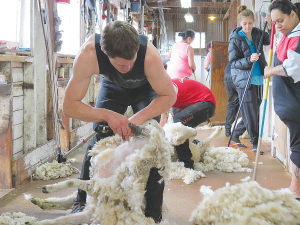Top shearers set for fast-paced speed shearing at Southern Field Days
Organisers are expecting another full field of 40 of the country’s top shearers for the popular Speed Shearing event at this year’s Southern Field Days at Waimumu.
 The Shearing Contractors Association has put out a set of guidelines on shearing in conjunction with Fed Farmers, which has been provided to MPI and Beef+Lamb.
The Shearing Contractors Association has put out a set of guidelines on shearing in conjunction with Fed Farmers, which has been provided to MPI and Beef+Lamb.
Shearing has been deemed an essential service, but people must come first, says Mike Barrowcliffe, NZ Shearing Contractors Association president.
“The last thing an 80-year-old farmer wants is a whole lot of young people who haven’t been self-isolating turning up to his place to shear his sheep,” he says.
Everyone should put safety first throughout the whole supply chain – from the farmers themselves to contractor employees, Barrowcliffe told Rural News.
“They need to ask the questions, is it essential and can it wait?” he says.
He says while everyone wants to go to work, not all can at the moment for many different reasons.
“We have to be mindful and respect people’s opinion. They might have an underlying health issue; someone they are caring for may have one or it may just be the age demographic.”
Barrowcliffe says everyone is taking Covid-19 very seriously.
“The self-isolation, the farmers preparing their work sites, what the shearing contractors are doing to get their staff to work, and while at work and once they have left work as well.”
He says animal welfare issues also must have priority.
“Let’s use preventive animal welfare issues rather than reactive ones.”
The New Zealand Shearing Contractors Association has put out a set of guidelines in conjunction with Federated Farmers which has been provided to MPI and Beef+Lamb.
“As long as everyone follows those and respects the intent of those well, I can’t see a problem with the current information we have and how to manage or control Covid-19.”
He says with so many jobs and tasks in farming you have to apply the rules as is required to each situation.
Barrowcliffe adds that flexibility is needed, but so is social responsibility.
“Reinforcing that yarn that farmers need to be proactive and think about what essential jobs are coming up, put steps in place to make sure that their work sites are set up for us to enter and for us to make sure we have got suitable staff that can come on and do the job for them.”
Coming in at a year-end total at 3088 units, a rise of around 10% over the 2806 total for 2024, the signs are that the New Zealand farm machinery industry is turning the corner after a difficult couple of years.
New Zealand's animal health industry has a new tool addressing a long-standing sustainability issue.
The Government has announced that ACC will be a sponsor of this year's FMG Young Farmer of the Year competition.
As veterinary student numbers grow to help address New Zealand's national workforce shortge, Massey University's School of Veterinary Science is inviting more veterinary practices to partner in training the next generation of vets.
South Island dairy farmers will soon be able to supply organic milk to Fonterra.
Norwood has announced the opening of a new Tasman dealership at Richmond near Nelson next month.

OPINION: Meanwhile, red blooded Northland politician Matua Shane Jones has provided one of the most telling quotes of the year…
OPINION: This old mutt has been around for a few years now and it seems these ‘once in 100-year’ weather…